Miami-based performer and educator talks about performing with Cachao, touring with Julio Iglesias and organizing jazz bass conferences
Exclusive interview with FBPO’s Jon Liebman
April 12, 2010
Nicky Orta grew up in a musical family and took up the electric bass at age 11. A natural from the start, Nicky studied with renowned instructor Vincent Bredice for twelve years and eventually earned a music scholarship at Miami-Dade Community College, where he became a member of the school’s “Top Secret” ensembles. Under the direction of John Georgini, Nicky performed with Miami-Dade’s Top Secret Big Band at the Montreux and North Sea Jazz Festivals and with the Top Secret Sextet for a 5-week “Ambassadors of Goodwill” tour of Africa, sponsored by the United States Information Agency. Nicky was subsequently recruited by the University of Miami and became an active member of the school’s Concert Jazz Band, with whom he toured and recorded.
Orta has performed and/or recorded with Arturo Sandoval, Randy Brecker, Othello Molineaux, Toots Thielemans, Mike Stern, Chick Corea, Paquito D’Rivera, James Moody, Danilo Perez, Dave Weckl, Gloria Estefan, Wayne Newton and countless others. He also toured with Julio Iglesias for seven years. He received a Grammy nomination for his work on the album “…And Sammy Walked In,” by Sammy Figueroa and his Latin Jazz Explosion.
In 1992, Nicky, along with fellow bassist Matt Bonelli, formed F-Clef Productions, Inc., and presented three Jazz Bass Conferences, featuring John Patitucci, Louis Johnson, Will Lee, Victor Wooten, Steve Bailey, Eddie Gomez, Michael Manring, Gerald Veasley, Jimmy Haslip and Gary Willis. The 1993 conference inspired Jim Roberts’ classic book, How the Fender Bass Changed the World.
Currently, Nicky is an adjunct faculty member at University of Miami Frost School of Music, where he teaches electric bass and directs the Classic Bop Ensemble.
FBPO: Tell me about your musical upbringing.
NO: Both my father and brother are musicians, so I was always around music growing up. I listened artists like Nat King Cole, the Mills Brothers, the Castro Brothers, and Ella Fitzgerald, as well as great ’70s music like Earth, Wind & Fire, Rufus with Chaka Khan, The Brothers Johnson, The Jackson 5 and Parliament/Funkadelic.
I tried to learn a few other instruments – piano, guitar and drums – but none of them inspired me. The moment I got a bass in my hands, however, I knew I had found the instrument for me. (That being said, I later took a liking to drums and I still believe I could be a good at it. I might just pursue that someday.) I was 11 years old when I got my first bass and I found that I had the ability to copy simple bass lines from records. I spent many hours in my room doing just that. One of the earliest records I remember listening to as a bass player was George Benson’s Good King Bad. That path eventually led me to great groups and artists like Headhunters, Return to Forever, Weather Report, Gino Vannelli and Steely Dan. Even though I play various styles of music, I find that the jazz genre is the one that I gravitate towards the most.
FBPO: What brought you to Miami? Weren’t you born in Las Vegas?
NO: My father was performing in Vegas when I was born. I believe my parents stayed in Vegas for several months and then we moved to Union City, New Jersey, where we lived for a few years. We moved to Miami in 1970 and I’ve been calling it home ever since.
FBPO: Vince Bredice seems to have had quite an influence on you. What was it like studying with him?
NO: Vince was probably the most important musical influence in my life. I remember the first time I met him. My dad took me to Miami-Dade Community College for my first lesson and I found Vince to be rather intimidating. He was very demanding and stern, it seemed to me. In fact, I decided not to study with him after that first meeting. After trying a few other bass teachers, I started thinking that maybe Vince’s passion was exactly what I needed. I went back to him for what turned into twelve years of fruitful study with a master educator.
The thing with Vince was that he didn’t expect anything less than the best from all of his students. He was never interested in superficial things. He wouldn’t take on a student that just wanted to learn licks or the latest song. Vince was interested in making all of his students great musicians. He taught me jazz theory and ear training and had me work out of Hindemith’s Elementary Training for Musicians and Traditional Harmony books.
Vince was also a taskmaster when it came to technique. He would have us play Paganini’s “Moto Perpetuo” or Bach’s Two-part Inventions – singing the top line while playing the bottom line on the bass. It wasn’t easy! Eventually, Vince and I became great friends. I was quite honored when he named me, along with Joe Diorio and Sid Jacobs, as one of his most noteworthy students in the introduction of his book, Mel Bay’s Complete Book of Guitar Improvisation. I loved Vince and I miss him greatly.
Also see our exclusive FBPO interviews with the
following bass players, all of whom are mentioned here:
[table id=61 /]
[table id=62 /]
FBPO: You’ve performed with some of the most notable figures in jazz. Was there a turning point in your life that made you realize you’d become established as a professional musician?
NO: Good question … and one I’ve never thought about! I honestly can’t recall any particular turning point where it dawned on me that I was established as a musician. Maybe that’s because I was always waiting for the next challenge. Over time, I suppose I managed to succeed at enough musical situations which, in turn, garnered me a reputation as a reliable bassist. I am always thankful that I’ve had the wonderful opportunities to play and record with so many of the incredible musicians I’ve admired. I hope that’ll continue!
FBPO: What was it like performing with “Cachao” (Israel Lopez)? It’s surprising more people don’t know about him, but he was quite a legend in authentic Cuban bass playing.
NO: I didn’t know Cachao that well. We met when Paquito D’Rivera recorded 40 years of Cuban Jam Session in 1993. The idea of the album was to get several generations of Cuban musicians together and recreate the spirit of Cuban jam sessions. One of the songs that Paquito wrote was for three basses and was called “Tres Tristes Tigres.” It featured me, Cachao and Kike Hernandez. Cachao was always smiling, joking and laughing. He had a great spirit and energy. Needless to say, he was fantastic at what he did. His grooves were burning!
FBPO: You toured with Julio Iglesias for seven years. What was that gig like?
NO: I got hooked up with Julio Iglesias through Jimmy Haslip. He had heard that Julio was going to be making changes in his band and he asked if I would be interested in the gig. I eventually met with Julio’s people, got charts and recordings from them and was flown to the Greek Theater in Los Angeles to audition for Julio. This was in 1994. He ended up liking what I added to his band and I stayed on for seven years.
It was a great gig but it had its challenges. Julio is used to a very definite type of sound and the trick was to find a way to give him the feeling he was used to while making it a little more progressive than it had been up to that point. I was able to do that and Julio was always kind and respectful towards me. Also, he had a whole host of hand gestures, signs and ways of relating ideas in non-musical terms that took a while to get used to. I must say it was the most extensive touring I’ve ever done. I went all around the world with him and it was quite something to witness his superstar status, particularly in Europe and Asia.
FBPO: As an educator, how do you advise your students regarding a career in music? On the one hand everybody wants to be a great player, but at the same time, they need to be able to make a living. How do you help them find that balance?
NO: I usually don’t broach that subject unless I am asked. I’m more interested in the passion and dedication that a student has in wanting to learn music. If they ask me about the music business, I’m very frank with them. I tell them that it can be a source of great fun, adventure and gratification, but there’s not a whole lot of security, particularly as a player. Of course, they can enter the field of music education, which opens up a lot of other possibilities. The bottom line is you have to do what you love. If things get rough, you find ways to persevere. That’s life.
FBPO: Tell me about F-Clef Productions and the Jazz Bass Conferences.
NO: I was teaching bass, along with Matt Bonelli, at Miami-Dade Community College in the early ’90s when Matt and I came up with the idea to develop a weekend conference that would focus specifically on jazz bass. This was before events like “Bass Day” and the rest of the current crop of bass camps came in to being. We formed F-Clef Productions specifically to get the conference off the ground. We knew that that the greatest challenge would be getting players for our first conference in 1992. Since we had no track record to speak of, we figured it would require a lot of convincing to get our guest artists. As it turned out, that didn’t prove to be the case at all. All the guys we contacted were so friendly and cooperative. John Patitucci had just left the (Chick Corea) Elektric Band and was the first to sign on to our conference. I managed to track down Louis Johnson and he too was ready, willing, and able. Finally, I spoke to Will Lee about the conference and, after discussing with him what we were trying to accomplish, he agreed to come down. It was a dream lineup for us!
We bolstered the weekend by adding local educators. Matt and I both did clinics and concerts and we had Don Coffman and Vince Bredice give master classes. Hiram Bullock came out to play with Will at his clinic. The whole experience was great. After the first conference, it was easier to approach guest artists, since we could always refer them to the guys we had in prior years.
Matt and I produced two more conferences, in 1993 and 1994, that featured Eddie Gomez, Gerald Veasley, Michael Manring, Jim Roberts (then editor of Bass Player magazine), Gary Willis, Jimmy Haslip, Steve Bailey and Victor Wooten. We never did manage to get a lot of sponsorship for our events, which meant that Matt and I practically paid for it all out-of-pocket. Unfortunately we weren’t able to keep it going, financially. I’m glad we had the experience, though. I found out through those conferences that the community of bass players is one of the most unselfish, caring groups of people you’d ever want to meet.
FBPO: What’s keeping you busy these days?
NO: I’ve been married for 13 years. I have a 17-year-old son, Justin, and an 11-year-old daughter, Anjelica. That’s enough to keep any man busy! Aside from that, I’ve been gigging a lot in town. One of my favorite gigs lately has been working with my wife, Debbie, who is an excellent singer and has a great jazz group. We’re in the process of recording her debut CD.
I am teaching at the University of Miami, as well as taking private students at my studio. I just got back from Costa Rica, where I did a couple performances and a master class. In the summer I’ll be directing the Latin Jazz Honors Band at the University of Miami Young Musicians Camp. I also try to practice at least 4 days a week.
FBPO: What do you like to do that doesn’t involve music?
NO: I love reading, watching movies, spending time with family and friends, traveling, cooking, and exercising.
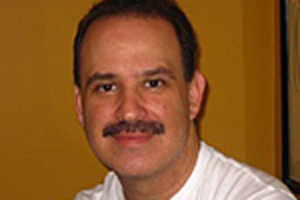

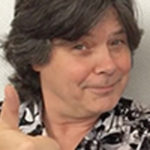

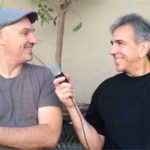
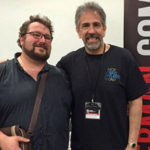
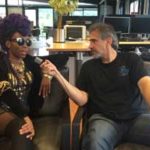
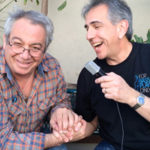
Prodigious gifts, playing, & outlook – thanks for sharing it all!